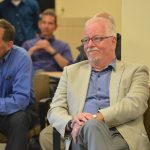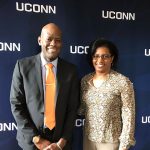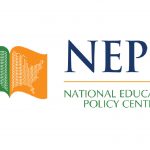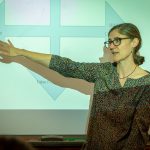After almost four decades of dedicated service, Brown retired Aug. 31, with a ground-breaking career and legacy that will continue to influence the University for years to come. Neag School and University faculty, past colleagues, current and former students, friends, and Brown’s family members came together earlier this month to celebrate him and his career.
This past academic year, UConn’s Neag School of Education, along with UndocuScholars at the University of California Los Angeles and the Association for the Study of Higher Education(ASHE) Presidential Commission on Undocumented Immigrants, co-sponsored a research brief dissemination serieshighlighting issues related to the undocu/DACAmented community.
Michael Forsyth ’15 (CLAS), ’16 MA had already served in the U.S. Navy aboard two submarines and started a family when he decided in his late 20s to work toward a college degree. After completing his undergraduate degree in mathematics at UConn in 2015, Forsyth went on to earn his master’s degree in curriculum and instruction through the 11-month Teacher Certification Program for College Graduates at the Neag School of Education. He has since been finding creative ways to teach math to students at Connecticut River Academy in East Hartford, Conn.
As the number of Holocaust survivors worldwide continues to dwindle each year, the question of how to preserve the stories of survivors as a means of remembrance and education becomes ever more relevant. Alan Marcus, associate professor in curriculum and instruction, is working to answer that question through research on three-dimensional, interactive technology.
Professor Preston Green IIIwas formally appointed the John and Maria Neag Professor of Urban Education on Aug. 14. A renowned expert in education law who joined the Neag School’s Department of Educational Leadership in 2013, Green also holdsa joint appointment in UConn’s School of Law.
UConn has received a $2.25 million grant from the National Science Foundation to expand and study a new public engagement program that combines teaching, service learning, and Extension outreach.
Dwight Sharpe, after receiving the 2018 Rogers Educational Innovation Fund, a $5,000 award that supports innovative projects carried out by Connecticut teachers at the elementary or middle-school level, has begun implementing his vision. Sharpe’s project, entitled “Accessing and Engaging in Mathematics Through Robotics and Computer Programming,” seeks “to explore and determine how robotics and computer programming can be embedded into middle school instruction to improve student engagement and achievement.” It was selected from among more than 40 submissions.
2019 marks the 50th anniversary of that landmark case, Tinker v. Des Moines School District, where Tinker and the other plaintiffs prevailed.
In the Q&A below, National Education Policy Center Fellow and University of Connecticut professor Preston Green III explains the significance of the case, tracing its implications to modern-day student speech issues (like those related to social media) that the 1965 Court could not have foreseen.
Sarah Woulfin, associate professor in the Neag School’s Department of Educational Leadership has been named co-editor of Educational Researcher(ER) for 2019 to 2022.
There are times, says Jamelle Elliott ’96 (BUS), ’97 MA, when she sticks her head in to watch the UConn basketball players practice for a few minutes, because she misses the sweet echo of a bouncing basketball.
Elliott spent four years on the women’s team, and during her junior year, the undefeated women Huskies won the 1995 NCAA National Championship over the Tennessee Lady Vols, sparking a 10-year rivalry. Elliott was just the second player to record more than 1,000 points and 1,000 rebounds in her 135-game career as a Husky. What’s more, the alumna of the School of Business and Neag School never missed a game, or a practice, in four years.










